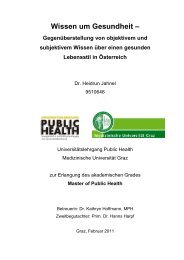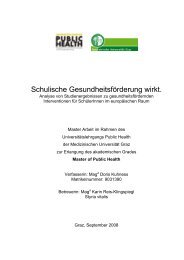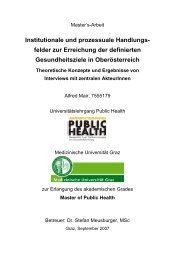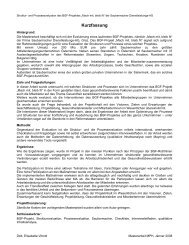Familienplanung bei Migrantinnen in Graz - Wissen ... - Public Health
Familienplanung bei Migrantinnen in Graz - Wissen ... - Public Health
Familienplanung bei Migrantinnen in Graz - Wissen ... - Public Health
Sie wollen auch ein ePaper? Erhöhen Sie die Reichweite Ihrer Titel.
YUMPU macht aus Druck-PDFs automatisch weboptimierte ePaper, die Google liebt.
Abstract<br />
Research background: People with migration background account for a significant proportion of<br />
the population <strong>in</strong> many cities of Austria. Immigrant women form a large percentage of the<br />
female population <strong>in</strong> <strong>Graz</strong>. The behavior, attitudes and decisions on family plann<strong>in</strong>g are<br />
<strong>in</strong>fluenced by lack of knowledge, values and norms of orig<strong>in</strong>al cultures and their personal<br />
migration history. This master thesis deals with the question, on how the family plann<strong>in</strong>g is<br />
<strong>in</strong>fluenced by migration.<br />
Method: In the first part the theoretical foundation on migration, women's health and family<br />
plann<strong>in</strong>g are expla<strong>in</strong>ed. In the empirical part the results of the research for this Thesis (Survey<br />
of 160 women with migration background <strong>in</strong> <strong>Graz</strong>) are presented. The target groups of the study<br />
were girls and women 15-45 years of age who live <strong>in</strong> a partnership. The surveys were carried<br />
out from July to November 2010 us<strong>in</strong>g a questionnaire. The central research question is the<br />
significance of migration and its related problems for the <strong>in</strong>dividual family plann<strong>in</strong>g. It was<br />
determ<strong>in</strong>ed which methods of contraception migrant women use, which are the preferred<br />
sources of <strong>in</strong>formation and how sufficient their knowledge of contraception is. Furthermore, the<br />
data related to the number of children, the current wish of a child, and other social and cultural<br />
factors related to the family plann<strong>in</strong>g were collected.<br />
Results: The outcome of this study shows some correlation between migration and family<br />
plann<strong>in</strong>g. Accord<strong>in</strong>gly the number of children and the use of contraception are <strong>in</strong>fluenced by<br />
cultural and social factors such as education, residence status <strong>in</strong> Austria and other factors. In<br />
addition, the survey shows that there is a clear need for <strong>in</strong>formation about contraception for the<br />
<strong>in</strong>terviewed group of immigrants.<br />
Discussion: The majority of women with migration background tend to encounter problems<br />
regard<strong>in</strong>g accessibility to necessary <strong>in</strong>formation and <strong>in</strong> relation to family plann<strong>in</strong>g services. The<br />
barriers are l<strong>in</strong>guistic, f<strong>in</strong>ancial and cultural / religious backgrounds. Therefore, <strong>in</strong> addition to<br />
language courses for immigrants, an <strong>in</strong>creased open<strong>in</strong>g of trans-cultural counsell<strong>in</strong>g centres and<br />
<strong>in</strong>stitutions for better support for women as to their access to contraception is recommended.<br />
Keywords: migration, migrants, family plann<strong>in</strong>g, contraception<br />
III







